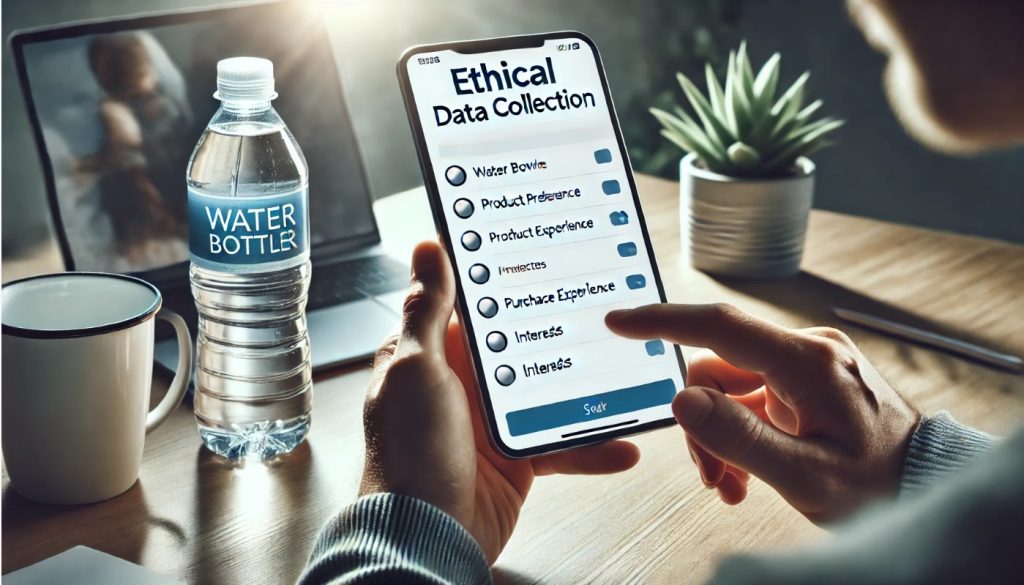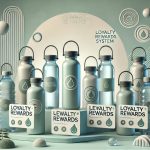The Importance of Ethical Data Collection in Marketing
In today’s data-driven world, businesses have access to an unprecedented amount of customer information. For water bottle brands, collecting and leveraging customer data can help refine marketing strategies, improve customer experience, and drive sales. However, the use of this data comes with significant responsibility. Ethical data collection is not just about complying with laws and regulations like the General Data Protection Regulation (GDPR) or California Consumer Privacy Act (CCPA); it’s about building trust with your customers and ensuring that their privacy is respected.
As the water bottle market becomes increasingly competitive, understanding your customers’ preferences, behaviors, and needs can provide a significant edge. But to do so ethically, you must be transparent, obtain consent, and prioritize data security. This article will explore best practices for collecting customer data for marketing water bottles, focusing on how to do it in an ethical, responsible, and effective way.
Understanding Customer Data and Its Value
Types of Customer Data for Marketing
Customer data falls into two main categories: personal data and behavioral data. Each type provides unique insights that can be used to improve marketing strategies for water bottle brands.
- Personal Data: This includes information that can directly identify a customer, such as their name, email address, phone number, and physical address. It can also include demographic data like age, gender, and location.
- Behavioral Data: This data tracks how customers interact with your brand, such as browsing patterns, past purchases, click-through rates, and interactions with email campaigns or social media ads. Understanding customer behavior is crucial for tailoring marketing messages and offers.
Both types of data offer value. Personal data is essential for direct communication and building long-term relationships with customers, while behavioral data helps you refine your messaging, offers, and customer engagement strategies. Collecting both ethically allows you to deliver personalized experiences while respecting customer privacy.
The Role of Customer Data in Marketing Water Bottles
For water bottle brands, effective marketing often depends on understanding customers’ habits, preferences, and motivations. Here are a few ways in which customer data can be utilized:
- Personalized Campaigns: By using customer data, you can send personalized recommendations and promotions. For example, if a customer buys a stainless steel water bottle, you can target them with promotions for cleaning supplies or bottle accessories.
- Product Development and Customization: Understanding customer preferences can inform product design and innovation. For instance, if a particular size or color of water bottle is in high demand, it may make sense to produce more of those options or offer customization services.
- Improved Customer Service: By knowing a customer’s past purchasing behavior, you can offer more tailored customer support, such as offering a discount on a replacement bottle if theirs is defective or sending care instructions for a specific material.
When used correctly, customer data enhances the customer experience, making interactions more relevant and meaningful. However, to ensure your marketing efforts are well-received, it’s crucial that you handle this data ethically.
Ethical Considerations in Customer Data Collection
Transparency and Consent
One of the most important aspects of ethical data collection is transparency. Customers should know what data is being collected, why it is being collected, and how it will be used. To collect data ethically, your water bottle brand must ask for consent from customers, especially when gathering personal or sensitive information.
- Clear Consent Requests: When customers sign up for your newsletter or make a purchase, include an explicit consent checkbox where they can agree to your data collection practices. Avoid pre-ticked boxes or ambiguous language that could confuse customers about how their data will be used.
- Privacy Policy: A clear, accessible privacy policy is essential. This policy should outline what data you collect, how it’s stored, and who it will be shared with (if anyone). Customers should have access to this information at any point in their interaction with your brand, especially when providing personal details.
Data Minimization: Collect Only What You Need
Data minimization refers to the practice of collecting only the data necessary for your business operations. For water bottle brands, this means you don’t need to collect excessive personal information unless it directly enhances your marketing or product offerings.
- Avoid Over-Collection: Limit the amount of personal information you request. For instance, asking for a customer’s birthday may not be essential unless you want to send birthday-related promotions. Similarly, asking for detailed demographic data like marital status might not provide value to your marketing strategy.
- Purpose Limitation: Ensure that the data you collect is only used for its intended purpose. If a customer provides their email address to receive a newsletter, don’t use that information for purposes like targeted ads or third-party sharing without their consent.
Data Security: Protecting Customer Information
Data security is crucial for ethical data collection. If you fail to protect your customers’ data, you not only jeopardize their privacy but also risk facing legal repercussions and losing customer trust.
- Encryption: Use strong encryption methods to protect sensitive customer data, especially when it’s being transmitted (e.g., during the checkout process).
- Access Control: Restrict access to customer data within your company to only those who need it. Employees should have access to customer data on a need-to-know basis.
- Regular Audits: Conduct regular audits to identify any potential security vulnerabilities and ensure that all data storage and handling practices meet security standards.
- Data Breach Plan: In the event of a data breach, have a plan in place to quickly notify customers and regulators, as required by data protection laws like GDPR.
Customer Rights and Control Over Their Data
As a brand, it’s important to respect the rights of your customers regarding their data. Customers should have control over their information, including the ability to access, correct, and delete it.
- Access and Portability: Allow customers to request a copy of their data in a structured format. For example, they may want to download their purchase history or the information you’ve collected for marketing purposes.
- Opt-Out and Unsubscribe: Customers should be able to easily opt out of marketing communications, data sharing, or tracking methods. Provide clear instructions for unsubscribing from newsletters or disabling targeted ads.
- Data Deletion: Customers should also have the right to request that their personal data be deleted from your systems if they no longer wish to receive communications or if they’ve decided to stop using your products.
Methods of Collecting Customer Data Ethically
Using Website Forms and Surveys
Website forms and surveys are an excellent way to collect customer data ethically while also gathering valuable feedback for marketing. These forms can be used to capture information when a customer signs up for your newsletter or makes a purchase.
- Signup Forms: When customers sign up for an account or join your mailing list, include fields for essential information (such as name, email, and location) along with an option to consent to marketing communications. Be clear about what type of emails or information they will receive, and offer an option to opt into product promotions or special offers.
- Surveys: Periodic surveys can help you learn more about your customers’ preferences and satisfaction with your water bottles. Use open-ended questions to gather qualitative data or multiple-choice questions for easier analysis. Always make sure participation is voluntary, and that you clearly explain how the survey data will be used.
Surveys and forms should be simple and focused on the data that will help you improve your products and services. For instance, you might ask questions about water bottle features that are important to your customers (e.g., size, color, insulation properties), which can guide product development and marketing.
Tracking Customer Behavior with Cookies and Analytics
Cookies and web analytics tools can provide insights into how customers interact with your website. Ethical tracking involves informing users about the use of cookies and obtaining their consent before tracking their activity.
- Cookie Banners: Display a cookie banner when customers visit your website for the first time. This banner should inform visitors about your use of cookies and offer an option to accept or customize cookie settings. Make it clear that cookies are used to track browsing behavior, improve the user experience, and tailor marketing campaigns.
- Analytics Tools: Tools like Google Analytics help you gather behavioral data, such as pages visited, time spent on the site, and products viewed. This data is valuable for improving website design, optimizing the user journey, and refining your marketing strategies. Be transparent about the use of these tools and ensure that customers can opt-out of tracking if they choose.
Remember, when using tracking methods, data should be anonymized wherever possible, and only necessary data should be collected for the intended purposes.
Social Media Engagement and Customer Feedback
Social media platforms offer an excellent opportunity to collect customer data ethically by engaging directly with your audience. Engaging in conversations and responding to comments provides insights into customer preferences, while also fostering brand loyalty.
- Polls and Feedback: Utilize features like polls, quizzes, and comments on platforms such as Instagram or Facebook to gather insights into customer preferences. For example, you could run a poll asking which new water bottle color your audience prefers or ask customers about their eco-friendly habits.
- Social Listening: Monitor social media platforms for mentions of your brand or related topics. Tools like Brandwatch or Hootsuite can help you track keywords, hashtags, or comments related to your water bottle brand. This method allows you to gather data on customer sentiment and preferences without directly asking for personal information.
While social media engagement provides valuable data, always respect the privacy of individuals. Avoid using data collected from social media conversations for marketing purposes without explicit consent.
Incentivizing Data Sharing through Loyalty Programs
Loyalty programs can be an excellent way to collect customer data ethically. Customers who opt into loyalty programs expect personalized offers and rewards in exchange for sharing their information.
- Personalized Rewards: Offer rewards such as discounts, exclusive offers, or early access to new products in exchange for customer information. For example, if a customer buys a specific water bottle, you might offer a discount on their next purchase or send them information about complementary products.
- Transparency and Control: As with any data collection method, make sure that customers are fully aware of the data you’re collecting and how it will be used. Allow them to customize their preferences within the loyalty program, such as choosing which types of promotions they want to receive.
By incentivizing customers to share their information, you create a mutually beneficial relationship where customers receive personalized benefits in return for their data.
Respecting Legal and Regulatory Frameworks
GDPR and CCPA Compliance
When collecting and processing customer data, it’s essential to comply with relevant data protection regulations, such as the GDPR (General Data Protection Regulation) and CCPA (California Consumer Privacy Act). These regulations require that you:
- Obtain explicit consent from customers for data collection and processing.
- Allow customers to access, modify, or delete their personal data.
- Notify customers in the event of a data breach.
Ensure that your privacy policy aligns with these regulations and that your data collection practices meet legal requirements.







